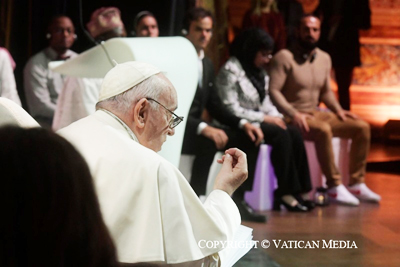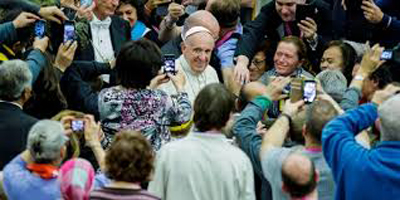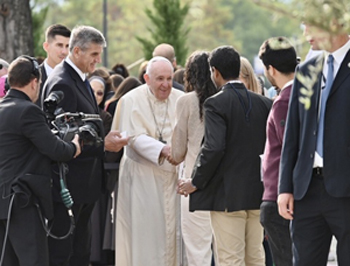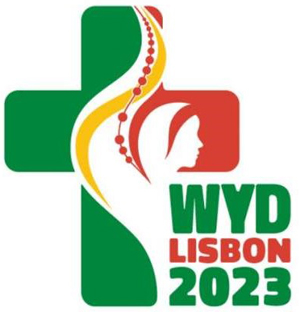VISIT TO ASSISI FOR THE EVENT “ECONOMY OF FRANCESCO” (Continuation)
Saturday, 24 September 2022
 Dear young people
Dear young people
Sustainability, then, is a multidimensional word. Aside from the environmental, there are also the social, relational and spiritual dimensions. The social aspect is slowly beginning to be recognized: we are realizing that the cry of the poor and the cry of the earth are the same cry (cf. Laudato Si’, 49). When we work for ecological transformation, then, we must keep in mind the effects that some environmental choices have on poverty. Not all environmental solutions have the same effects on the poorest, and therefore those that reduce misery and inequality should be preferred. As we seek to save the planet, we must not neglect those who suffer. Carbon dioxide is not the only pollution that kills; inequality also fatally damages our planet. We must not allow the new environmental calamities to erase from public view the long-standing and ever-present calamities of social injustice, as well as political injustices. ...
Then there is the unsustainability of our relationships: in many countries relationships between people are becoming impoverished. Especially in the West, communities are becoming increasingly fragile and fragmented. The family, and with it the acceptance and protection of life, is suffering a serious crisis in some regions of the world. Current consumerism seeks to fill the void of human relationships with ever more sophisticated commodities – loneliness is big business in our time! – but in this way it generates a famine of happiness. This is not a good thing. Think of the demographic winter, for example, and how it relates to all this. The demographic winter where the population of all countries is going down significantly because, instead of having children, people give greater attention to having emotional relationships with dogs and cats. We have to start procreating again. But also in this demographic winter there is the slavery of women: a woman who cannot be a mother because as soon as her belly begins to rise, they fire her; pregnant women are not always allowed to work.
 Finally, there is a spiritual unsustainability to our capitalism. Human beings, created in the image and likeness of God, are seekers of meaning before being seekers of material goods. We are all seekers of meaning. That is why the first capital of any society is spiritual capital, for this is what gives us a reason to get up every morning and go to work, and engenders the joy of living that is also necessary for the economy. Our world is quickly consuming this essential kind of capital, accumulated over centuries by religions, wise traditions and popular piety. Consequently, young people especially suffer from this lack of meaning. [...] The fragility of many young people comes from a lack of this precious spiritual capital – an invisible but more real capital than financial or technological capital. ... We urgently need to rebuild this essential spiritual patrimony. Technology can do much: it teaches us the “what” and the “how”: but it does not tell us the “why”; and so our actions become sterile and do not bring fulfilment to life, not even economic life.
Finally, there is a spiritual unsustainability to our capitalism. Human beings, created in the image and likeness of God, are seekers of meaning before being seekers of material goods. We are all seekers of meaning. That is why the first capital of any society is spiritual capital, for this is what gives us a reason to get up every morning and go to work, and engenders the joy of living that is also necessary for the economy. Our world is quickly consuming this essential kind of capital, accumulated over centuries by religions, wise traditions and popular piety. Consequently, young people especially suffer from this lack of meaning. [...] The fragility of many young people comes from a lack of this precious spiritual capital – an invisible but more real capital than financial or technological capital. ... We urgently need to rebuild this essential spiritual patrimony. Technology can do much: it teaches us the “what” and the “how”: but it does not tell us the “why”; and so our actions become sterile and do not bring fulfilment to life, not even economic life.
Economy of Francesco Finding myself in the city of Francis, I cannot help but speak about poverty. Developing an economy inspired by him means committing ourselves to putting the poor at the centre. Starting with them, we look at the economy; starting with them, we look at the world. There is no “Economy of Francesco” without respect, care and love for the poor, for every poor person, for every fragile and vulnerable person – from conception in the womb to the sick person with disabilities, to the elderly person in difficulty. I would go even further: an economy of Francesco must not limit itself to working for or with the poor. [...] Let us ask ourselves. Are we doing enough to change this economy or are we content with painting a house in order to change its colour without changing the structure of the house?
Finding myself in the city of Francis, I cannot help but speak about poverty. Developing an economy inspired by him means committing ourselves to putting the poor at the centre. Starting with them, we look at the economy; starting with them, we look at the world. There is no “Economy of Francesco” without respect, care and love for the poor, for every poor person, for every fragile and vulnerable person – from conception in the womb to the sick person with disabilities, to the elderly person in difficulty. I would go even further: an economy of Francesco must not limit itself to working for or with the poor. [...] Let us ask ourselves. Are we doing enough to change this economy or are we content with painting a house in order to change its colour without changing the structure of the house?
Saint Francis loved not only the poor but poverty itself. This can also be called an austere way of living. Francis went to lepers not so much to love them but because he wanted to become poor like them. Following Jesus Christ, he stripped himself of everything to become poor with the poor. Indeed, the first market economy was born in the thirteenth century in Europe through daily contact with Franciscan Friars, who were friends of the first merchants. That economy certainly created wealth but it did not despise poverty. Our capitalism, instead, wants to help the poor but does not respect them; it does not understand the paradox in the beatitude: “Blessed are the poor” (cf. Lk 6:20). We do not have to love poverty. On the contrary, we need to combat it, above all, by creating work, dignified work. The Gospel tells us, however, that without respect for the poor, we cannot combat poverty. It is from here that all of us need to begin, including entrepreneurs and economists: living the evangelical paradoxes of Francis.
In light of this reflection, I would like to leave you with three signposts for moving forward.
- The first is to look at the world with the eyes of the poorest of the poor.
- The second: you are mostly students, scholars and entrepreneurs, but do not forget about work, do not forget about
workers.
- The third signpost is incarnation.
To read the full message Click here


















